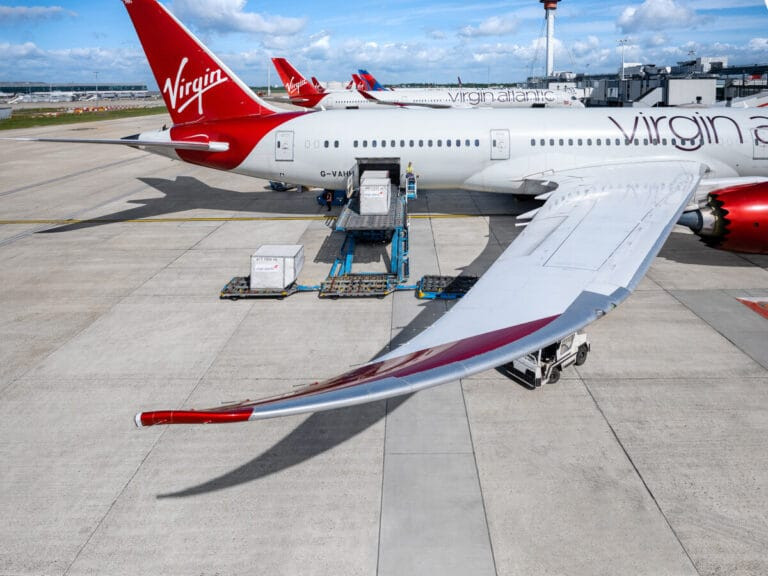Virgin Atlantic Cargo has overhauled its freight strategy across continental Europe, consolidating operations under a single structure offering supervision services across 14 countries. The shift, anchored by a control tower in the Netherlands, is designed to streamline oversight, improve shipment visibility, and tighten alignment with the carrier’s transatlantic cargo focus.
The decision to move to a unified airfreight operational support model followed what the airline describes as a thorough selection process.
“We conducted a vigorous tender process with several high-performing entities,” said Laura Baillie, commercial development manager at Virgin Atlantic Cargo. “TCE emerged as the ideal partner by demonstrating the ability to deliver a unified pan-European solution that aligns with Virgin Atlantic Cargo’s high operational and commercial standards.”
A fragmented model has been replaced with centralised oversight and coordination.
“The pan-European proposition provides a streamlined and more efficient service for our customers, allowing for better shipment tracking visibility and reliability of our service,” Baillie said.
Why the Netherlands?
The Netherlands has become the operational centre of the model. A new control tower there provides real-time coordination of trucking, capacity, and service across the continent.
“We implemented an operations control tower, based in the Netherlands, to enable greater efficiency through truck consolidation and improved visibility for our customers across Europe,” Baillie explained. “Trucks are now manifested and departed from origin, providing improved transparency and tracking.”
The location also enables closer coordination between Virgin Atlantic’s commercial teams and TCE’s network, facilitating faster responses to market shifts and operational disruptions.
Rolling out a new structure across 14 markets required detailed planning, particularly around peak season timelines.
“Any change and implementation can be a challenge,” Baillie said. “However, with extensive planning and foresight, we transitioned smoothly and drove benefits as soon as possible.”
The team timed each handover to avoid disruption, and in markets where the company changed suppliers, it ensured that implementation didn’t interrupt day-to-day operations.
“By moving from our incumbent suppliers when relevant, with a focus on our peak season, we ensured the implementation was managed effectively and seamlessly to enable continuity with our customers as we continued to provide the service we are renowned for.”
Simplified trucking for clearer access
The partnership brings all European trucking contracts under one management system. This not only reduces administrative complexity but also enables a more uniform customer experience.
“All European trucking contracts are now managed under TCE, streamlining operations and oversight,” Baillie noted. “Our innovative solution streamlines the transportation of freight across the continent, ensuring efficiency and reliability for our valued customers.”
With Europe identified as a long-term growth area for cargo exports, the airline is also investing in customer support.
“We are appointing a key account manager based at our Netherlands control tower and investing in dedicated resources in key markets,” Baillie said.
To evaluate the effectiveness of the new structure, Virgin Atlantic Cargo has relaunched its customer feedback programme. The updated survey design focuses on capturing responses from across the shipment lifecycle, not just at the point of booking or delivery.
“We value our customers’ feedback. It’s how we learn, improve, and make sure we’re meeting their expectations,” Baillie said. “The survey gives us insight into customer satisfaction across all regions so we can monitor and act.”
Alongside formal survey results, the company relies on close communication between its sales teams and GSSA representatives across the EU.
“Our sales teams are in regular contact with our EU GSSAs, maintaining an open and trusted relationship that’s built on transparency and collaboration,” Baillie added. “It allows our teams to respond proactively to local market dynamics and deliver the best possible service to our customers.”
Digital tools
Innovative infrastructure played a central role in the transition. Virgin Atlantic Cargo required that real-time visibility tools be embedded from the outset.
“Our implementation plan prioritised real-time visibility to enhance tracking, transparency, and reporting for our customers,” Baillie said.
The operations control model allows trucks to be manifested and dispatched directly, rather than routed through disparate regional hubs. This has resulted in better shipment tracking and earlier intervention when delays occur.
Baillie also said both organisations see scope for further digital development:
“We are excited to share learnings and collaborate on how we can drive our digitalisation initiatives across the businesses moving forward, to the benefit of Virgin Atlantic Cargo’s customers on the continent.”
Sustainability through consolidation
Beyond operational efficiency, Virgin Atlantic Cargo is also using the model to advance its environmental objectives.
“Sustainability drives both of our business strategies,” Baillie said. “This partnership strengthens our shared commitment to driving more sustainable air cargo operations across the EU and the world.”
Truck consolidation across Europe reduces the number of vehicles required to support export activity, while better load planning helps optimise aircraft utilisation.
“Our truck consolidation supports reducing emissions and optimising flight capacity to enable smarter, greener logistics solutions,” she added.
While the current scope covers 14 European countries, the model is intended to scale. “Virgin Atlantic Cargo sees opportunities to broaden its presence in Europe, leveraging TCE’s expertise to assess new market entry points and service expansion possibilities,” Baillie said.





